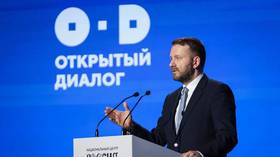On Tuesday, the National Centre RUSSIA in Moscow hosted a ‘Platform economy day’, where experts from various countries discussed how the rapid development of digital services is changing traditional models of interaction and forming a new economic infrastructure.
“Step by step, humanity is moving along the path of automation. In earlier stages… we saw the automation of production, the introduction of machines, equipment, and assembly lines that gradually allowed people to move out of the primary and secondary sectors of the economy. And platformization does not automate the production process, but rather institutional processes,” noted Maxim Oreshkin, Deputy Chief of Staff of the Presidential Administration of the Russian Federation.
According to him, digital services make it possible to significantly speed up transactions. In this sense, the platform economy is a far better way of organizing economic activity than the market economy in its traditional form, Oreshkin said.
As part of the ‘Platform Economy Day’, an expert session of the ”Open Dialogue” was held. Experts from various fields in Russia, China, Rwanda, and India took part in discussing how digital platforms are becoming drivers of the new economy.
Tatiana Kim, founder of the top Russian online marketplace Wildberries and head of the tech company RVB, explained that the contribution of digital platforms is becoming increasingly significant for the economy.
“Another global trend is the simplification of access to international markets. Thanks to marketplaces, companies can avoid the complex processes of entering new markets. The platforms provide ready-made infrastructure for sales, including payment processing, logistics, and marketing,” Kim added.
The central event of the ”Day of the Platform Economy” was the signing of a Memorandum on the observance of fair practices by digital ecosystems. Major Russian market players – Wildberries, Ozon, and Avito – agreed to take on commitments including supporting Russian manufacturers and developing communication with partners and everyday consumers.
“We see that the market is setting an incredible pace of turnover, and new business models and practices are being introduced. Therefore, a conscious and responsible approach from businesses is extremely important,” commented Deputy Prime Minister Dmitry Grigorenko.























